Providing development opportunities for community partners in Tijuana, Mexico
World Vision and GULL | May, 2011
Mexico – an overview
 Mexico, the world’s most populous Spanish-speaking country, is bordered by the United States to the north, Guatemala and Belize to the southeast, the Pacific Ocean to the west, and the Gulf of Mexico and Caribbean Sea to the east. Mexico City, the capital and economic hub of the country, is the third largest metropolitan area in the world behind Tokyo and New York. Approximately 60 percent of people living in Mexico are mestizo—those with a mixture of Amerindian and Spanish ancestry. The indigenous Amerindian peoples make up 30 percent of the population, while the remaining 10 percent are Caucasian, mostly of European descent.
Mexico, the world’s most populous Spanish-speaking country, is bordered by the United States to the north, Guatemala and Belize to the southeast, the Pacific Ocean to the west, and the Gulf of Mexico and Caribbean Sea to the east. Mexico City, the capital and economic hub of the country, is the third largest metropolitan area in the world behind Tokyo and New York. Approximately 60 percent of people living in Mexico are mestizo—those with a mixture of Amerindian and Spanish ancestry. The indigenous Amerindian peoples make up 30 percent of the population, while the remaining 10 percent are Caucasian, mostly of European descent.
Despite classification as an upper-middle income country, there remains a significant disparity between the wealthy and the poor in Mexico. Nearly 18 percent of Mexicans live below the poverty line using the food-based definition of poverty; asset-based poverty levels amount to more than 40 percent.
World Vision’s work in Mexico
 Low wages, unequal income distribution, and limited opportunities for progress in the impoverished southern states have led to 25 percent nationwide under-employment rates and an increase in the number of working children. UNICEF estimates that more than 5 million Mexican children are part of the labour force.
Low wages, unequal income distribution, and limited opportunities for progress in the impoverished southern states have led to 25 percent nationwide under-employment rates and an increase in the number of working children. UNICEF estimates that more than 5 million Mexican children are part of the labour force.
World Vision began partnering with the people of Mexico in 1963 when a child sponsorship programme was launched. Development work in the first seven years included well-drilling, poultry raising, and vocational training. The Mexico field office opened in 1977, and by the end of 1980, more than 25,000 children were receiving food, school supplies, vitamins, clothing, and medical check-ups.
There are currently more than 61,000 children registered in the World Vision sponsorship programme.
(Above) Tijuana, Mexico
World Vision’s Early Childhood Development process
Children raised ...in poor families are most at risk for infant death, low birth weight, stunted growth, poor adjustment to school, increased repetition and drop-out rates. (World Vision Education White Paper 5 on ECD, 2001).
Early Childhood Development (ECD) refers to the processes by which children from ages birth - 9 grow and flourish socially, physically, mentally, emotionally, spiritually and morally.
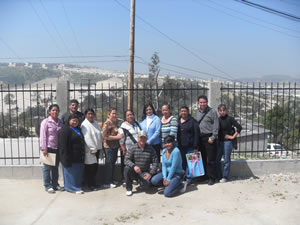 ECD is essentially a vehicle to facilitate social support and behaviour change at community level. People share their concerns, problems, experiences and skills and they learn from each other. GULL’s action learning process blends well with ECD and enables community volunteers to professionalize their work. This also fosters empowerment and sustainability because the WV-GULL cascade approach encourages transformation through community participation. As the numbers participating increase, it is easier for them to lead and secure social change at the grassroots level.
ECD is essentially a vehicle to facilitate social support and behaviour change at community level. People share their concerns, problems, experiences and skills and they learn from each other. GULL’s action learning process blends well with ECD and enables community volunteers to professionalize their work. This also fosters empowerment and sustainability because the WV-GULL cascade approach encourages transformation through community participation. As the numbers participating increase, it is easier for them to lead and secure social change at the grassroots level.
(Right) WV-GULL community participants, Tijuana, Mexico
How is ECD-GULL equipping community participants?
ECD provides the technical input and GULL the framework for personal growth and learning – this combination creates synergistic benefits. GULL’s narrative format is based on a personal learning statement, daily, weekly, monthly summaries and project review. This provides a framework that helps to systematize ECD and affirm the learning that is taking place.
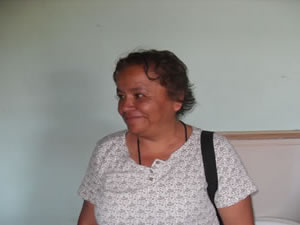 The ECD-GULL process requires at least three months so that the first team of volunteers can be trained and are ready to cascade the process via home group meetings. The initial training is provided by an experienced facilitator and this person must be familiar with and committed to both ECD and GULL. The training workshops are held weekly for two-three hours. Education technical staff at World Vision’s National Office and Area Development Program levels are key people in the process.
The ECD-GULL process requires at least three months so that the first team of volunteers can be trained and are ready to cascade the process via home group meetings. The initial training is provided by an experienced facilitator and this person must be familiar with and committed to both ECD and GULL. The training workshops are held weekly for two-three hours. Education technical staff at World Vision’s National Office and Area Development Program levels are key people in the process.
(Above) Nohemi Castañeda ‘My ECD-GULL work has helped me to improve myself – to set higher goals for my life. Together with my colleagues, we work and help each other.’
GULL-ECD: A high touch, low tech, cost efficient tool for grassroot community transformation.
Indicative ECD-GULL learning outcomes
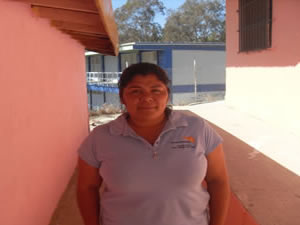

(Above left) Griselda Galván ‘GULL has helped me to learn how to listen to people and to organize myself. I have also learnt from the experiences of other people and I have motivated my family so that they too want to learn new skills.’
(Above right) Matilde Arroyo ‘With ECD and GULL I am learning to be a better mother and wife and to communicate more effectively with my husband and children. I am also learning new skills that will help my community.’
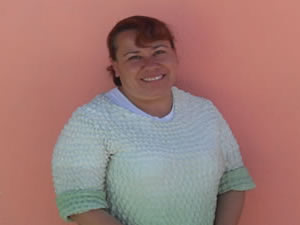
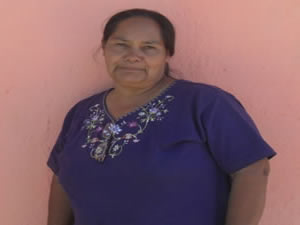
(Above left) Maria Martínez ‘GULL is helping me to better communicate the needs in our community and to encourage other mothers to get involved so that they too can make improvements for themselves and for their families. I have also motivated my own teenage girls by my example and they also want to make changes in their lives.’
(Above right) Susana Trejo ‘GULL and ECD has helped me to develop the confidence to speak in public and to guide others in the Christian faith - I now lead people in prayer at our meetings.’
Noemi Castaneda's story...
Noemi is a 55 year old World Vision volunteer from San Luis, Area Development Program Canon del Sainz in Tijuana, Mexico. When she started her learning journey she was very shy, often depressed, with low self-esteem. She had been taking care of her elderly mother who had recently passed away and also caring for her two grandsons. Life has been very tough for Noemi. But she committed herself to learn and she worked hard in preparing her GULL personal learning statement and weekly summaries. She also worked hard to learn the ECD methodology and Noemi created her own visual aids for many of the topics.
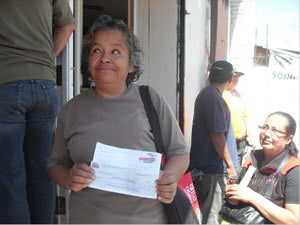 The expansion of the ECD work to Camino Verde gave Noemi the opportunity to share her learning with people from other communities and this boosted her self-esteem. People really like Noemi and readily accept her. Today Noemi enjoys her work with her colleagues. She is often smiling and her face radiates with a new sense of confidence. She is also earning an income from the government’s Secretary for Social Development for the work she does in Camino Verde. We trust Noemi will continue building up the groups she works with in San Luis and Camino Verde, becoming more and more involved in the transformation of these communities.
The expansion of the ECD work to Camino Verde gave Noemi the opportunity to share her learning with people from other communities and this boosted her self-esteem. People really like Noemi and readily accept her. Today Noemi enjoys her work with her colleagues. She is often smiling and her face radiates with a new sense of confidence. She is also earning an income from the government’s Secretary for Social Development for the work she does in Camino Verde. We trust Noemi will continue building up the groups she works with in San Luis and Camino Verde, becoming more and more involved in the transformation of these communities.
(Above) Nohemi Castaneda with her pay check
GULL is a not-for-profit foundation registered in California, USA. GULL is recognized by the Government of Papua New Guinea & endorsed by other Governments, Leaders & Institutions.
- Download Article - PDF
May, 2011
World Vision and GULL